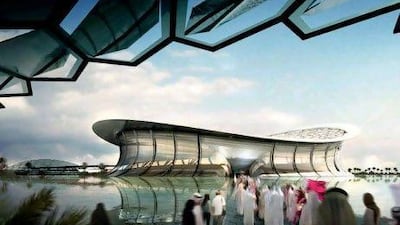The Fifa bribery scandal has heightened controversy surrounding Qatar's winning bid to host the 2022 World Cup, and with it concerns surrounding up to US$10 billion (Dh36.73bn) worth of investment and development contracts in the country.
Qatar's bid team outlined $77bn of spending on infrastructure to support the World Cup before it was named the host last year, but analysts say most of that money is earmarked for development projects that are going ahead independently of it.
Small item for big spender Qatar’s US$645.5 million (Dh2.37 billion) budget to host the Fifa World Cup is only the tip of iceberg. The GCC country is counting on the tournament in 2022 to spark a wide range of construction projects.
Stadiums Projected cost: $3bn
Tourism Projected cost: $17bn
Metro/Rail System Projected cost: $24bn
Roads Projected cost: $20bn
Airport Projected cost: $3bn
Total: $77bn
Source: 2022 World Cup bid report
They estimate that about $5bn to $10bn of development is contingent directly on football's biggest tournament, money that will go towards stadiums and hotels for anticipated legions of visitors.
While they are significant in scale, those are investments that the country could afford to lose given its small population and tiny tourism industry, said Farouk Soussa, the chief economist for the region at Citi.
"We've argued that there's little economic benefit in hosting the World Cup in Qatar," Mr Soussa said.
A big question for Qatar's World Cup bid was whether it really needed the 84,000 hotel rooms outlined in the country's bid report, according to a property analyst who asked not to be identified. Qatar currently has about 9,000 hotel rooms.
"To keep those rooms viable, they need to do much more to grow a sustainable tourism industry, and there is a question on whether that is necessary," the analyst said, while playing down the notion that the World Cup was of critical significance for the country's economic development.
"The World Cup itself is beneficial for the month it happens and as a stimulus for making infrastructure investment, hotel investment and improving the offering, but it's not going to be the overall solution," Mr Soussa said.
Fifa decided on Sunday to suspend Qatar's Mohammed bin Hammam, the head of the Asian Football Confederation, pending a full investigation into allegations of bribery involving his bid to replace Sepp Blatter as the head of world football's governing body.
Mr bin Hammam was not directly involved in Qatar's World Cup bid and he said yesterday he would appeal against the suspension.
The suspension comes just days after the GCC country's bid committee rejected claims of wrongdoing made in the British parliament.
"Since participating and succeeding in the bidding process, the bid committee has been subject to a variety of serious allegations.
"However, none of these allegations has ever been substantiated. Indeed, they have all been false," the Qatar bid committee said.
The main risk for Qatar springing from the cloud of allegations was perceptional, Mr Soussa said. Markets have already reacted negatively to Mr bin Hammam's suspension, with Qatar's main market index falling slightly by 0.24 per cent yesterday.
But Sebastien Henin, a portfolio manager at The National Investor in Abu Dhabi, said even the potential impact on markets was minimal. Qatari stocks are thinly traded, he said, adding that the World Cup effect had perhaps been overestimated.
"We saw a lot of figures after the World Cup announcement, but 70 or 80 per cent of this spending was already in the pipeline," he said.
The Fifa secretary general Jerome Valcke further fanned the flames of controversy yesterday when he confirmed the veracity of an e-mail he had sent to the vice president Jack Warner, who is also facing bribery charges, suggesting the 2022 World Cup was "bought" by Qatar.
"It was a private e-mail and we will discuss it.
"He sent me an e-mail asking if I want that [Mr bin Hammam to run], he said that I should ask Mr bin Hammam to pull out," Mr Valcke said in Zurich yesterday.
His comments came after an Australian politician urged his country's government to ask for a refund from Fifa after it spent A$46 million (Dh180.7m) on a failed bid to host the 2022 World Cup.
Nick Xenophon, an independent politician, said the bid could not succeed because of the corruption allegations within the organisation.
It is still unclear whether the investigations and allegations will affect Qatar's bid to host the World Cup.

